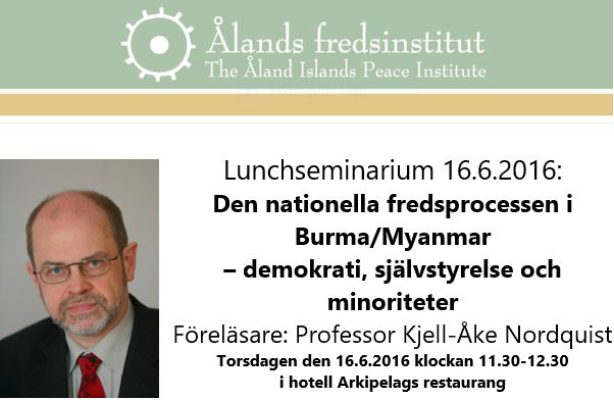On 16 June, the ÅIPI will arrange a lunch seminar on the national peace process in Burma Myanmar with Professor Kjell-Åke Nordquist. The seminar will be held in Swedish at Hotell Arkipelag in Mariehamn at 11.30. Lunch can be purchased in the restaurant and taken to the workshop to be held at the secluded southern end of the restaurant. The seminar starts at 11.30 and lasts one hour.
Kjell-Åke Nordquist is the Director of the Åland Islands Peace Institute, and has been working in the fields of autonomy and conflict resolution both as a researcher and a practitioner, and has been a member of the Board as well as the Research Council of the Åland Islands Peace Institute since its start. As a practitioner he has been working with peace processes mainly in Colombia, the Middle East, and South East Asia (Timor-Leste, Burma).
In Burma/Myanmar, various parts of the phased negotiation process that will lead to a national peace accord, is currently under planning. Since autumn 2015 there is a ceasefire, signed by several armed ethnic armies and the government. The forms of political and broad completion of the different civil wars, that have occurred in the country since the 1960s, is still subject to negotiations. One of the major issues is how to implement self-government structures within the federal system of Burma/Myanmar.
Union Peace Dialogue Joint Committee (UPDJC) is a working group in charge of the political dialogue, where the leaders of the eight ethnic groups that have signed ceasefire are participating. In mid-March, Kjell-Åke Nordquist took part in a Strategic Planning Workshop in the country, arranged by UPDJC, which included issues of minority rights, cultural heritage and the return of refugees.
In the elections in 2015, the National League of Democracy – led by Nobel peace laureate Aung San Suu Kyi – won a landslide victory. The newly elected government and the president has always supported the peace process, launched by the previous military government. The military retains 25 percent of the seats in the country’s parliamentary Union, which is why every major change in the policy stance, including the Constitution, requires the consent of the military. Nonetheless, a peaceful and democratizing revolution has taken place in the country in recent years, the elections to the parliaments and the president could be held without serious unrest.



